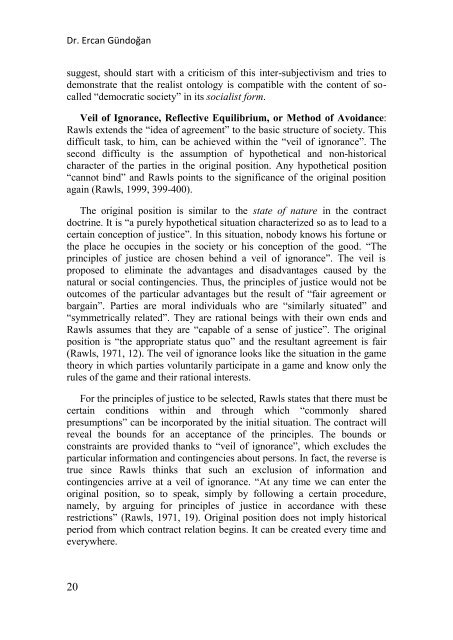SEEU Review vol. 5 Nr. 2 (pdf) - South East European University
SEEU Review vol. 5 Nr. 2 (pdf) - South East European University
SEEU Review vol. 5 Nr. 2 (pdf) - South East European University
Create successful ePaper yourself
Turn your PDF publications into a flip-book with our unique Google optimized e-Paper software.
Dr. Ercan Gündoğan<br />
suggest, should start with a criticism of this inter-subjectivism and tries to<br />
demonstrate that the realist ontology is compatible with the content of socalled<br />
“democratic society” in its socialist form.<br />
Veil of Ignorance, Reflective Equilibrium, or Method of Avoidance:<br />
Rawls extends the “idea of agreement” to the basic structure of society. This<br />
difficult task, to him, can be achieved within the “veil of ignorance”. The<br />
second difficulty is the assumption of hypothetical and non-historical<br />
character of the parties in the original position. Any hypothetical position<br />
“cannot bind” and Rawls points to the significance of the original position<br />
again (Rawls, 1999, 399-400).<br />
The original position is similar to the state of nature in the contract<br />
doctrine. It is “a purely hypothetical situation characterized so as to lead to a<br />
certain conception of justice”. In this situation, nobody knows his fortune or<br />
the place he occupies in the society or his conception of the good. “The<br />
principles of justice are chosen behind a veil of ignorance”. The veil is<br />
proposed to eliminate the advantages and disadvantages caused by the<br />
natural or social contingencies. Thus, the principles of justice would not be<br />
outcomes of the particular advantages but the result of “fair agreement or<br />
bargain”. Parties are moral individuals who are “similarly situated” and<br />
“symmetrically related”. They are rational beings with their own ends and<br />
Rawls assumes that they are “capable of a sense of justice”. The original<br />
position is “the appropriate status quo” and the resultant agreement is fair<br />
(Rawls, 1971, 12). The veil of ignorance looks like the situation in the game<br />
theory in which parties <strong>vol</strong>untarily participate in a game and know only the<br />
rules of the game and their rational interests.<br />
For the principles of justice to be selected, Rawls states that there must be<br />
certain conditions within and through which “commonly shared<br />
presumptions” can be incorporated by the initial situation. The contract will<br />
reveal the bounds for an acceptance of the principles. The bounds or<br />
constraints are provided thanks to “veil of ignorance”, which excludes the<br />
particular information and contingencies about persons. In fact, the reverse is<br />
true since Rawls thinks that such an exclusion of information and<br />
contingencies arrive at a veil of ignorance. “At any time we can enter the<br />
original position, so to speak, simply by following a certain procedure,<br />
namely, by arguing for principles of justice in accordance with these<br />
restrictions” (Rawls, 1971, 19). Original position does not imply historical<br />
period from which contract relation begins. It can be created every time and<br />
everywhere.<br />
20

















